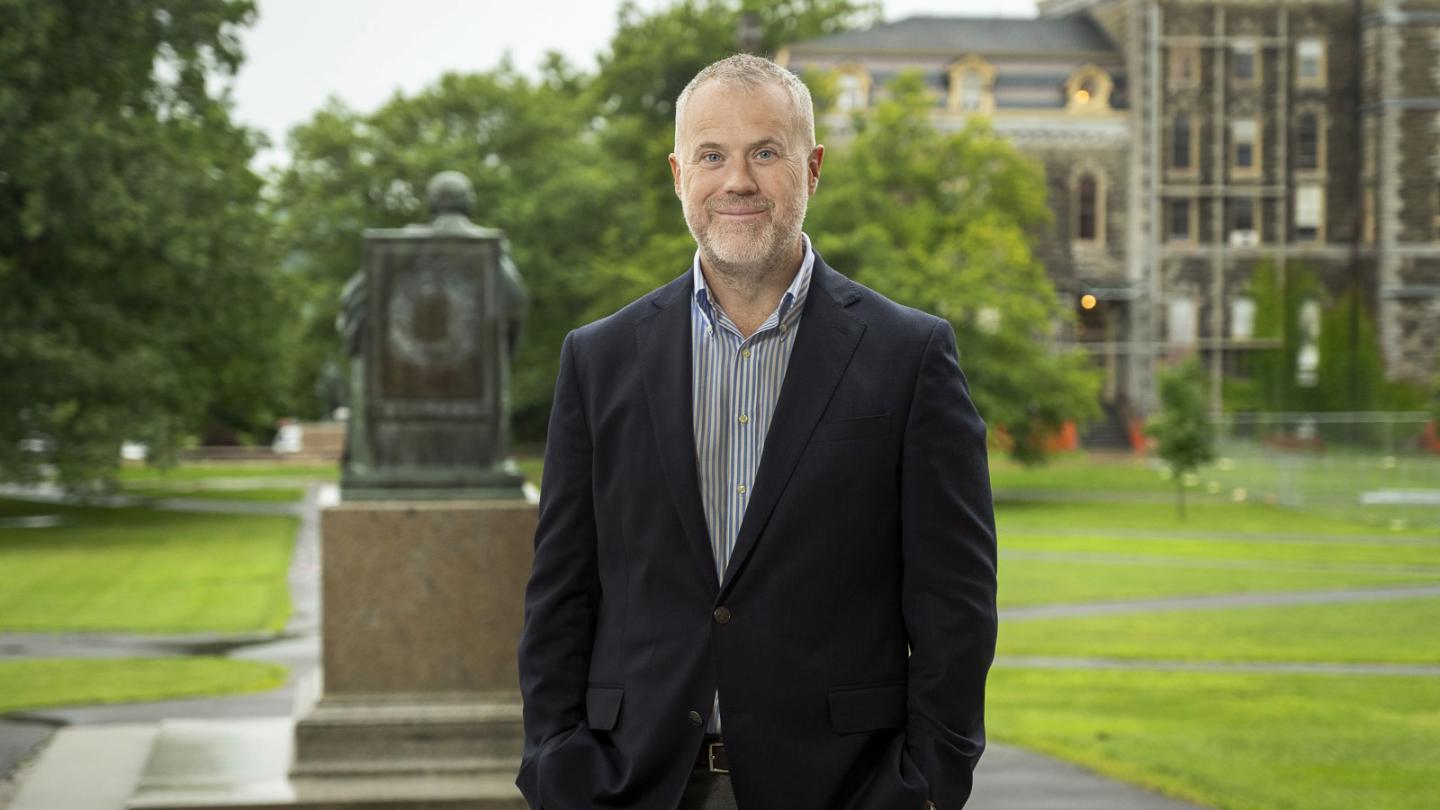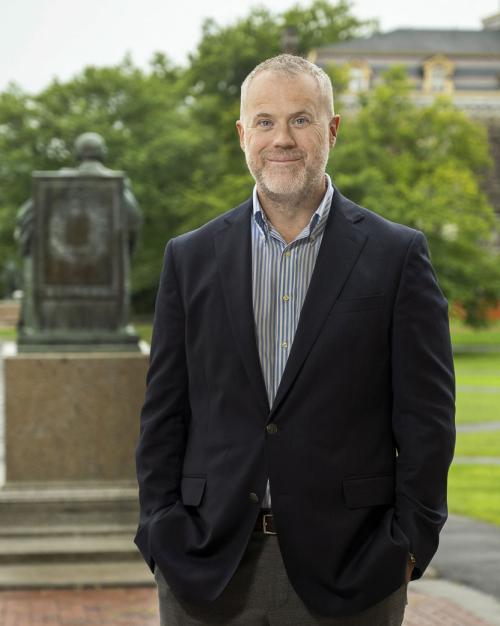Peter John Loewen grew up in a house surrounded by books, where politics was the principal topic of conversation around the dinner table. Though his parents hadn’t gone to college, they let him know throughout his childhood that they expected him to.
Loewen didn’t just go to college: he found “a life in the university.” He said his experience as an undergraduate at Mount Allison University in Sackville, New Brunswick “opened my eyes to the world.” Today he is the new Harold Tanner Dean of the College of Arts & Sciences.
As the leader of Cornell University’s largest college, Loewen will be part of opening the eyes of thousands of students to their possibilities. The chance to do that – while supporting A&S faculty in their research and showcasing the value of a liberal arts education — is what brought him to Cornell.
“The university has a special mission of helping students to discover their future selves, to draw a picture of who they could be, and then helping them to get there,” he said. “And at this moment, when there’s growing skepticism about the public relevance and value of universities, we need to be ready to articulate the outsized impact that universities like Cornell have to change lives and change the world.”
A Canadian education
Growing up in North Bay, Ontario, Loewen was a “keen” and “bookish” student whose dad worked in construction management; his mom worked in the insurance industry before becoming a minister in the Church of England. Once Loewen arrived at Mount Allison, “I really took to all aspects of the university, wrote for the school paper, had a radio show, was in student government,” he said. “I felt that knowing my professors as people was important, that being involved in the community around the university was important, and it was thrilling.”
He earned a bachelor’s degree in political science (with a minor in economics) in 2002 and thought about going to law school or into business when he graduated, but eventually decided to follow the advice of a professor and go to grad school in the city where he wanted to live, Montreal, at the Université de Montréal.
He joined a lab focused on electoral and voting behavior. “That was my exposure to more systematic, quantitative political science that was survey based,” he said, which allowed him to pick up skills in econometrics and cemented his plans to become a professor. “I enjoyed that kind of puzzle-solving aspect of social science.”
He received his doctoral degree in 2008, moved on to postdoctoral fellowships at the University of British Columbia and the University of California, San Diego and joined the University of Toronto in 2010.
His research and teaching interests include the future of democratic societies and the politics of technological change. He is interested in how politicians can make better decisions, in how citizens can make better choices, and how governments can address the disruption of technology and harness its opportunities. He has also studied the political and social contexts and consequences of COVID-19.
At Toronto, he saw the opportunity to be involved in leadership and public engagement as well as research. He moved up through various positions at the university, eventually being named the Robert Vipond Distinguished Professor in Democracy in the Department of Political Science. He directed the Policy, Elections and Representation Lab (PEARL) and was associate director of the Schwartz Reisman Institute for Technology and Society. His most recent post was director of the Munk School of Global Affairs and Public Policy.
On the public engagement front, Loewen was a member of a three-person nonpartisan commission redrawing federal electoral boundaries in the province of Ontario; he served as an expert on cases surrounding the conduct of elections in Canada; and he also chaired a group that advises Canada on which parties to include in federal debates.
Supporting A&S faculty and students
At Cornell, he’s excited about the opportunity to recruit and retain the stellar faculty members who are part of the A&S community and also support faculty in their research.
“The more people you work with, the more people you can help,” Loewen said. “Part of the magic of this job is that I always enjoy getting a paper published. I just had a paper come out this week and I’m so excited about it. But if you can play a little role in helping a colleague do this, then you can multiply that thrill by dozens or hundreds. That’s tremendously fulfilling.”
Loewen’s new paper, “From Gender Gap to Gender Gaps: Bringing Nonbinary People into Political Behavior Research,” uses data from 2019 and 2021 Canadian Election Studies to explore whether nonbinary people differ from men and women in their party identification and voting behavior.
At Toronto, he also enjoyed talking with students about their journeys and plans to do that here. “They’ve got an array of things they’re interested in around campus and a different course that is their favorite. By talking with them, you can learn about their incredible diversity of experiences,” he said.
During his first few months, Loewen will be meeting with chairs of the College’s departments to learn about their strengths and their challenges. “This is a very well-governed and well-run university, so I step into the role with strong senior associate deans and a thoroughly professional structure of people around me,” he said.
Because the world is becoming more multi-disciplinary, and its problems multi-dimensional, the College is in a privileged position to bring knowledge to bear to solve those problems and make discoveries, he said.
As Loewen settles in, his family is also getting used to Ithaca. His wife, Yvette, is joining Cornell’s alumni affairs and development team as a major gifts officer and his kids, Wolfgang, 9 and Dagny, 5, are exploring the area’s outdoor spaces and getting ready to start school in Ithaca.
“We’re moving to a great town with tons of resources, a bit removed from reality, but it’s a special place,” he said with a smile. “And for kids, it’s a remarkable privilege to grow up around a university.”
One burning question remains: will Loewen continue to be a fan of Canadian hockey or change his allegiance to an American team?
“I’ve been a Pittsburgh Penguins fan since I was 5 years old,” he said with a laugh. “They were terrible when I was 5, but great by the time I was 12, and when they won their first Stanley Cup against the Minnesota North Stars, I was a pretty happy guy. I’m a Big Red hockey fan now”





